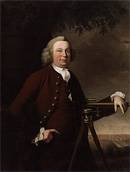 James Brindley was born in 1716 and lived at Tunstead, near Buxton. His father was a farm labourer, who squandered his earnings on drink and making bets at bull-baiting contests. James did not go to school instead, he spent his time wandering around the fields scaring birds from the crops, which was a job often done by little boys.
James Brindley was born in 1716 and lived at Tunstead, near Buxton. His father was a farm labourer, who squandered his earnings on drink and making bets at bull-baiting contests. James did not go to school instead, he spent his time wandering around the fields scaring birds from the crops, which was a job often done by little boys.
When James was older he drove wagons of corn to the local mill where he watched the corn being ground using waterpower. Fascinated by the process, he made small models of the machinery, setting them to work in the streams, which overflowed from the troughs in the farmyard. At the age of 17 he was apprenticed to a millwright, but he was lazy and a poor worker, his boss threatened to send him home.
By 21, he had his own business, where he designed and built his own machinery for a paper mill and received an order for machinery for the Wedgwood pottery. As his business expanded, James employed more men in his workshops, he travelled around the country on horseback examining machines in mills and mines and finding ways of improving them. He found that the main hazard in a coalmine was the danger of flooding and he invented a machine to pump out the water when they were flooded.
Because of his remarkable ingenuity, he was nicknamed ‘The Schemer’, yet at the age of 40 he was still unable to read or write. All his inventions were worked out in his head. If he had a difficult problem to solve, he would go to bed for a few days to think it out.
In 1759 James met the Duke of Bridgewater, who wanted James to find a way of crossing the River Irwell, so that he could transport coal to Manchester to sell. James suggested an aqueduct, which everyone laughed at. However, the plan went ahead and was a complete success. This was the beginning of the inland canal system we have today and the name Brindley soon became famous. James Brindley’s most famous canal was the Trent and Mersey canal, built to link, Liverpool, Bristol and Hull.
James Brindley married at 50. He was married for 6 years, when he caught a severe chill, whilst inspecting a canal at Leek. He died on September 27th 1716. In total he created 365 miles of inland waterways. Because he helped to improve communications with his canals, James Brindley helped to hasten the industrial revolution. He was a self-made engineer, who undertook all his works without written calculations or drawings, leaving no records except the works themselves.
He was an inspiration to others and a local hero. In Brindley we aim to achieve his qualities of determination and perseverance in all that we do. We hope that we can help you develop your skills to help our house be the best it can!